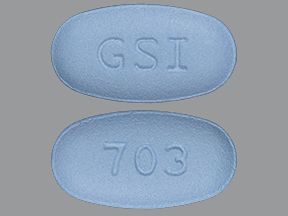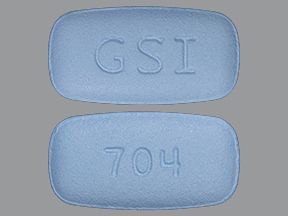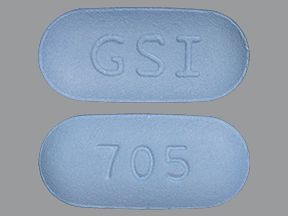Truvada (emtricitabine/tenofovir disoproxil fumarate) is a prescription drug that’s used to treat and prevent HIV. The drug comes as a tablet. It’s usually taken once per day.
Truvada is used in adults, adolescents, and some children to treat HIV. It can also be used to prevent HIV in adults and adolescents who have known risk factors. Using Truvada to prevent HIV is called preexposure prophylaxis (PrEP).
The active ingredients* in Truvada are emtricitabine and tenofovir disoproxil fumarate. Truvada belongs to a group of drugs called nucleoside reverse transcriptase inhibitors (NRTIs).
This article describes the dosages of Truvada, as well as its strengths and how to take it. To learn more about Truvada, see this in-depth article.
* An active ingredient is what makes a drug work.
The Truvada dose your doctor prescribes will depend on your body weight. The recommended doses also vary between adults, adolescents, and children. The weight ranges are listed in the table below in kilograms (kg).*
Truvada tablets come in different strengths of emtricitabine (FTC) and tenofovir disoproxil fumarate (TDF). The strengths of both drug ingredients are measured in milligrams (mg). You’ll take Truvada once per day. See the table below for more information.
| Age group and weight | Once-daily Truvada dose for HIV treatment | Once-daily Truvada dose for HIV prevention |
| adults | 200 mg FTC/300 mg TDF | 200 mg FTC/300 mg TDF |
| adolescents who weigh 35 kg or more | 200 mg FTC/300 mg TDF | 200 mg FTC/300 mg TDF |
| children who weigh 35 kg or more | 200 mg FTC/300 mg TDF | – |
| children who weigh 28 kg to 34 kg | 167 mg FTC/250 mg TDF | – |
| children who weigh 22 kg to 27 kg | 133 mg FTC/200 mg TDF | – |
| Children who weigh 17 kg to 21 kg | 100 mg FTC/150 mg TDF | – |
Note: This table highlights the basics of Truvada’s dosage. Be sure to read on for more detail.
* One kg equals approximately 2.2 lbs.
What is Truvada’s form?
Truvada comes as a tablet you swallow.
What strengths does Truvada come in?
Truvada comes in the following strengths:
- 200 mg FTC/300 mg TDF
- 167 mg FTC/250 mg TDF
- 133 mg FTC/200 mg TDF
- 100 mg FTC/150 mg TDF
What are the usual dosages of Truvada?
Your doctor will likely start you on the dosage of Truvada that’s recommended for your age and weight.
The information below describes dosages that are commonly used. But be sure to take the dosage your doctor prescribes for you.
Dosage for HIV treatment
The dosage of Truvada for HIV treatment in adults is 200 mg FTC/300 mg TDF taken once per day.
Dosage for HIV prevention (PrEP)
The dosage of Truvada for preexposure prophylaxis (PrEP) in adults is 200 mg FTC/300 mg TDF taken once per day.
What’s the dosage of Truvada for children and adolescents?
The dosage of Truvada for HIV treatment in children and adolescents depends on their body weight:
- For children and adolescents who weigh at least 35 kg, the daily dosage is one tablet containing 200 mg FTC/300 mg TDF.
- For children who weigh 28 kg to 34 kg, the daily dosage is one tablet containing 167 mg FTC/250 mg TDF.
- For children who weigh 22 kg to 27 kg, the daily dosage is one tablet containing 133 mg FTC/200 mg TDF.
- For children who weigh 17 kg to 21 kg, the daily dosage is one tablet containing 100 mg FTC/150 mg TDF.
Truvada isn’t used in children who weigh less than 17 kg or who are unable to swallow a tablet.
For PrEP, Truvada may be prescribed to adolescents who weigh at least 35 kg. The dosage for HIV prevention is one tablet containing 200 mg FTC/300 mg TDF, taken once per day.
Is Truvada used long term?
Yes, Truvada is typically used as a long-term treatment. If you and your doctor determine that it’s safe and effective for your condition, you’ll likely take it long term.
Dosage adjustments
If you’re taking Truvada to treat HIV and you have kidney disease, your dosage of Truvada may be adjusted. Your doctor will measure your creatinine clearance to see which stage of kidney disease you have.
If you have stage 3 kidney disease, you’ll probably take your dose every 48 hours instead of every day. If you have stage 4 or end-stage kidney disease, your doctor may suggest a different medication for you.
Also, your doctor is unlikely to prescribe Truvada for PrEP if you have kidney disease that has advanced to stage 3 or greater.
The dosage of Truvada you’re prescribed may depend on several factors. These include:
- your age
- your weight
- your kidney health (see “Dosage adjustments” in the section above)
Truvada comes as a tablet that you swallow. You’ll take your dose of Truvada once per day with or without food. If you have trouble swallowing tablets, see this article for tips on how to take this form of medication.
For information on the expiration, storage, and disposal of Truvada, see this article.
Accessible drug containers and labels
Some pharmacies provide medication labels that:
- have large print or use braille
- feature a code you can scan with a smartphone to change the text to audio
Your doctor or pharmacist may be able to recommend pharmacies that offer these accessibility features if your current pharmacy doesn’t.
If you have trouble opening medication bottles, let your pharmacist know. They may be able to supply Truvada in an easy-open container. They may also have tips to help make it simpler to open the drug’s container.
If you missed your dose of Truvada, take it as soon as you remember. But if it’s almost time for your next dose, skip that dose and take your next dose at the regular time. You should not take two doses at once to make up for a missed dose.
It’s very important not to miss doses of Truvada. If you’re taking Truvada for preexposure prophylaxis (PrEP), missing a dose can increase your risk of developing HIV. And if you take Truvada to treat HIV, missing a dose can increase the risk of viral resistance. This will make it harder to treat HIV.
If you need help remembering to take your dose of Truvada on time, try using a medication reminder. This can include setting an alarm or downloading a reminder app on your phone.
Do not take more Truvada than your doctor prescribes as this can lead to serious side effects.
What to do in case you take too much Truvada
Call your doctor right away if you think you’ve taken too much Truvada. You can also call 800-222-1222 to reach America’s Poison Centers or use its online resource. But if you have severe symptoms, immediately call 911 (or your local emergency number) or go to the nearest emergency room.
The sections above describe the usual dosages provided by the drugmaker. If your doctor recommends Truvada for you, they’ll prescribe the dosage that’s right for you.
Remember, you should not change your dosage of Truvada without your doctor’s recommendation. Only take Truvada exactly as prescribed. Talk with your doctor if you have questions or concerns about your current dosage.
Here are some examples of questions you may want to ask your doctor:
- Should my dosage change if Truvada isn’t working well enough for me?
- Would a different dosage increase or reduce my risk of side effects from Truvada?
- If I’m taking other medications, will my Truvada dosage be adjusted?
To learn more about Truvada, see these articles:
- Truvada (emtricitabine and tenofovir disoproxil fumarate)
- Side Effects of Truvada: What You Need to Know
- Truvada and Cost: What You Need to Know
To get information on different conditions and tips for improving your health, subscribe to any of Healthline’s newsletters. You may also want to check out the online communities at Bezzy. It’s a place where people with certain conditions can find support and connect with others.
Disclaimer: Healthline has made every effort to make certain that all information is factually correct, comprehensive, and up to date. However, this article should not be used as a substitute for the knowledge and expertise of a licensed healthcare professional. You should always consult your doctor or another healthcare professional before taking any medication. The drug information contained herein is subject to change and is not intended to cover all possible uses, directions, precautions, warnings, drug interactions, allergic reactions, or adverse effects. The absence of warnings or other information for a given drug does not indicate that the drug or drug combination is safe, effective, or appropriate for all patients or all specific uses.



